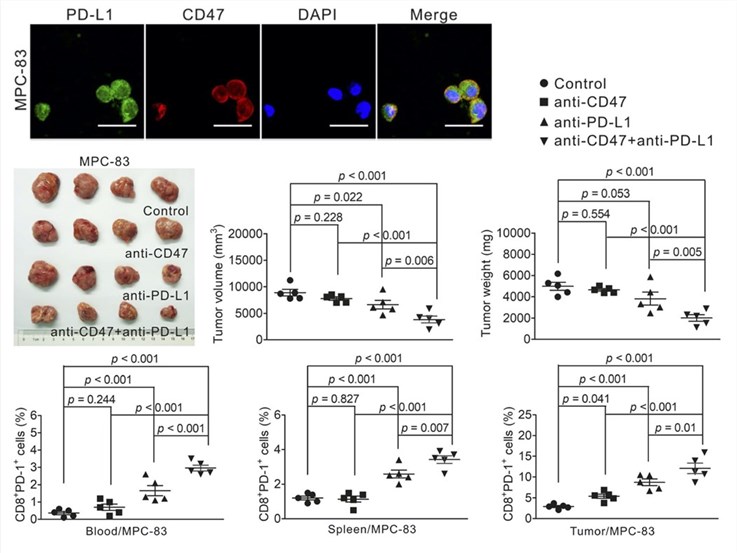The immunological checkpoint of programmed death-1 (PD-1) and its ligand PD-L1 are renowned for their ability to unleash anti-tumor T-cell immunity, despite the fact that it is suppressed in many tumor types. Another well-known target, CD47, is overexpressed on a variety of malignant cells and functions as an innate inhibitory checkpoint by preventing the phagocytosis of cancer cells and the subsequent activation of innate responses. As a result, tumor cells can avoid being noticed by the body's natural immune system as well as the adaptive immune system. More than 50% of human malignancies express both CD47 and PD-L1, making immune checkpoint molecule targeting in combination treatment an interesting target with promising early results.
A CD47 and PD-L1-targeting bispecific antibody (BisAb) can inhibit both innate and adaptive immune checkpoint pathways. In comparison to anti-CD47 or anti-PD-L1 antibody treatment alone, the BisAb-based therapy on mice with subcutaneous tumors results in increased tumor-killing activity in vivo and improves survival rates. The tumor rejection is lessened when an inactive form of BisAb is used. Analysis of the total T cells in the tumors of BisAb-treated mice reveals that CD8+ T cells are more enriched than control cells and that the proportion of Tregs is lower. Both are evidence of a potent antitumor reaction.
The ability of transplanted cells to normally express CD47 and PD-L1 in vivo is demonstrated by immunofluorescent staining. These mice are then given monoclonal antibodies of anti-CD47 and anti-PD-L1 separately or in combination to assess their anti-tumor effectiveness. In the group receiving combined therapy, the tumor volume is further declining, pointing to a synergistic interaction between these two antibodies. The combined treatment enhanced the fraction of PD-1+CD8+ T cells in all samples compared to either anti-CD47 or anti-PD-L1 alone, according to flow cell analysis of the lymphocytes isolated from spleen, peripheral blood, and tumor tissue.
 Fig.1. Enhanced inhibitory effect of anti-CD47 and anti-PD-L1 is observed when targeting the MPC-83-induced tumor mode.1,2
Fig.1. Enhanced inhibitory effect of anti-CD47 and anti-PD-L1 is observed when targeting the MPC-83-induced tumor mode.1,2
The world's top biotechnology vendor, Creative Biolabs, has a number of innovative platforms for immune checkpoint therapy. Please feel free to contact us for more information about your project.
References
All listed customized services & products are for research use only, not intended for pharmaceutical, diagnostic, therapeutic, or any in vivo human use.
USA
Tel:
Fax:
Email:
Copyright © 2026 Creative Biolabs. All Rights Reserved.